 MyDogBreeds
MyDogBreeds Norwegian Lundehund is originated from Norway but Bordoodle is originated from United States. Norwegian Lundehund may grow 15 cm / 5 inches shorter than Bordoodle. Norwegian Lundehund may weigh 18 kg / 39 pounds lesser than Bordoodle. Both Norwegian Lundehund and Bordoodle has almost same life span. Both Norwegian Lundehund and Bordoodle has almost same litter size. Norwegian Lundehund requires Moderate maintenance. But Bordoodle requires Low maintenance
Norwegian Lundehund is originated from Norway but Bordoodle is originated from United States. Norwegian Lundehund may grow 15 cm / 5 inches shorter than Bordoodle. Norwegian Lundehund may weigh 18 kg / 39 pounds lesser than Bordoodle. Both Norwegian Lundehund and Bordoodle has almost same life span. Both Norwegian Lundehund and Bordoodle has almost same litter size. Norwegian Lundehund requires Moderate maintenance. But Bordoodle requires Low maintenance
 The Norwegian Lundehund hails from the island of Vaeroy, Norway and was created for the purpose of puffin hunting.
The Norwegian Lundehund hails from the island of Vaeroy, Norway and was created for the purpose of puffin hunting.
Now that these puffins are a protected species, the dog is no longer used for hunting and has become a companion dog.
The breed decreased in numbers during- and after World War II because the islands where he came from had an outbreak of distemper. It was in 1963 that another outbreak occurred and the dogs were almost wiped out. A breeding program saw their numbers being built up.
It was in 2011 that the dog was recognized by the American Kennel Club.
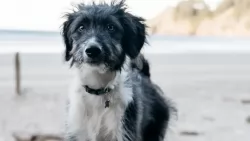 Known also as a Borderpoo or Borderdoodle, the Bordoodle is a designer- or hybrid breed which hails from the United States of America.
Known also as a Borderpoo or Borderdoodle, the Bordoodle is a designer- or hybrid breed which hails from the United States of America.
Both the dogs used in the development of this cross-breed are the Poodle and the Border Collie, and both these dog breeds have their own lengthy histories.
The history of the Bordoodle is short, as it is a modern crossbreed which has been purposefully bred by breeders to bring about a dog with certain looks and temperament.
 As a spitz-type dog, with the Lundehund you’ll recognize the typical spitz-dog characteristics – the erect ears and the tail that curves over the back.
As a spitz-type dog, with the Lundehund you’ll recognize the typical spitz-dog characteristics – the erect ears and the tail that curves over the back.
He is a small to medium sized dog standing at 30 – 40cm and weighing 6 – 9kg. He is an active dog and is as agile as a fox.
He has a dense double coat which is white, reddish/tan with some black tips. He is a dog which sheds constantly.
Strangely this dog has 6 toes and his rear pads have elongated foot pads which have helped the dog be able to climb over rocks. He also has a flexible type of neck that is capable of craning back so that the head touches the spine. The dog has some unique features and wriggling in and out of small spaces is another of his characteristics. In fact he can do things that you would not imagine a dog could do.
When you have a Lundehund in your life you’ll agree he has a happy, amicable personality. He is non-aggressive.
He will require training and socialization as he is an independent dog who can be obstinate. He is quite aloof with strangers too and once he starts barking at them he tends to want to continue. Training him will put an end to that irritating behavior. He is a loving, loyal dog, enjoying the company of his human family.
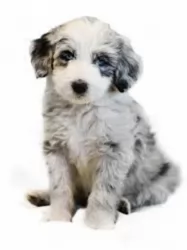 The Bordoodle isn’t a purebred dog but is a cross between a Poodle and a Border Collie.
The Bordoodle isn’t a purebred dog but is a cross between a Poodle and a Border Collie.
He has a soft, medium length coat which is inclined to be wavy. Colors are essentially black and white but chocolate, cream, fawn, merle and grey are also seen.
He is a medium sized dog standing at between 38cm and 55cm and weighing between 13kg and 27kg. The long tail is feathery, the ears floppy or semi-erect and the brown eyes are bright and intelligent. The muzzle is medium to long.
As with any mixed breed dog, the Bordoodle can take after either parent dog but generally the Borderdoodle will be a medium sized dog.
With the Bordoodle you can expect nothing less than a highly intelligent dog. That is because both the Poodle and the Border Collie are super intelligent dogs so the Bordoodle is guaranteed to have got a good portion of this intelligence from both breeds.
It makes training and socialization easy for the dog. It is important for your Bordoodle to be trained and socialized if you want him to be obedient and relaxed around strangers and other pets. As it is, his amicable nature makes the hybrid dog of yours a great family pet – getting on well with other pets in the home as well as with children.
Apart from being such a smart dog, the Bordoodle is active, playful, loving and devoted – everything a serious dog owner wants in a pet. This is a dog that doesn’t really know the meaning of the word aggressive.
 The Norwegian Lundehund isn’t your everyday dog and in fact he is known as a primitive breed. Perhaps he wouldn’t be the best dog to have if you’re a first-time dog owners as training is quite difficult too.
The Norwegian Lundehund isn’t your everyday dog and in fact he is known as a primitive breed. Perhaps he wouldn’t be the best dog to have if you’re a first-time dog owners as training is quite difficult too.
People who are willing to take a chance on him say that with training and socialization he can become a loving canine companion.
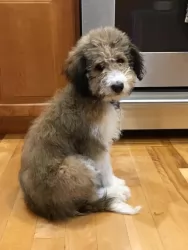 Bordoodles have two great dog breeds to thank for the way they turn out. When you think of the Border Collie and Poodle, you know you’re going to get a dog that is friendly, social, playful, loving and devoted – the ideal family pet.
Bordoodles have two great dog breeds to thank for the way they turn out. When you think of the Border Collie and Poodle, you know you’re going to get a dog that is friendly, social, playful, loving and devoted – the ideal family pet.
Intelligent, he is easy to train too, and with excellent care, you’re going to have a most wonderful family pet and companion, full of fun and life.
 The Lundehund is prone to digestive disorders but even so he has got a good chance of living to be 11, 12, 13 or 14 years of age with good care.
The Lundehund is prone to digestive disorders but even so he has got a good chance of living to be 11, 12, 13 or 14 years of age with good care.
He is however, one of these dogs prone to health problems of which chronic intestinal disease is one. Its the kind of illness that can recur because it is resistant to treatment.
Experts on these dogs say that they should have a fecal test done every 6 months or so, saying that one thing a bit negative with this dog breed is that you may well be forking out quite a bit on chronic veterinary care.
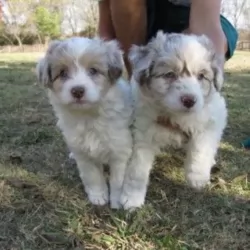 Bordoodles, when well cared for, can live to be 12-15 years of age. There aren’t going to be many health issues to contend with with your Bordoodle as there are no known health problems in this robust breed.
Bordoodles, when well cared for, can live to be 12-15 years of age. There aren’t going to be many health issues to contend with with your Bordoodle as there are no known health problems in this robust breed.
Nonetheless there are some common dog illnesses that you need to be aware of such as progressive retinal atrophy, hip dysplasia and hypothyroidism.
With hypothyroidism, the thyroid gland in the neck of your pet produces a hormone known as thyroxine that controls metabolism, but the disease hypothyroidism makes it that the gland doesn’t make enough thyroxine. Signs that your dog has this illness includes a dull coat, inflamed skin and even hair loss.
Get him to the vet immediately who will do blood tests and provide treatment. Mercifully it isn’t something that is life-threatening.
 Like any other dog, the Norwegian Lundehund will do well on the best quality food. If you buy him commercially manufactured food, check the ingredients on the packaging. Lots of these lower quality foods are made from ingredients that are toxic for your pet, so buy a good quality one.
Like any other dog, the Norwegian Lundehund will do well on the best quality food. If you buy him commercially manufactured food, check the ingredients on the packaging. Lots of these lower quality foods are made from ingredients that are toxic for your pet, so buy a good quality one.
Buy food according to your dog’s age and activity levels. To make his meals more interesting, add in some delicious home prepared food for him. Stay away from spicy, exotic foods and go for something like boiled chicken, brown rice and vegetables. Some raw meat added to the kibble from time to time can also do wonders for your pet as he requires a high-protein diet. Make sure he always has access to fresh, cool water.
Other ‘caring’ things to do to make sure your pet has a quality lifestyle is -
Brush his hair twice a week as he is a fairly heavy shedder. Not only does it keep the coat nice and shiny, it builds up a bond between you and your pet.
Check his ears and eyes regularly to make sure they are free from infection.
Clip his nails when they get long as your pet can hurt himself if the nails hook onto things.
Whenever he is ill, get him to the vet for a check-up.
Make sure he has a nice safe, dry, warm, snug place to sleep.
Keep him well exercised. A dog that is put into the backyard and more or less forgotten will be most miserable. Why get a pet if you don’t want to make him a 100% part of the family?
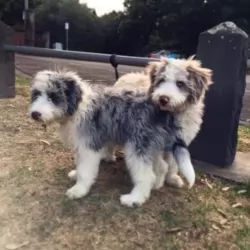 The Bordoodle is a dog which doesn’t shed that much so his grooming requirements are low and he is considered as a hypoallergenic dog.
The Bordoodle is a dog which doesn’t shed that much so his grooming requirements are low and he is considered as a hypoallergenic dog.
He will need to have his coat brushed at least twice a week to keep it shiny, soft and smooth. Depending on how your Bordoodle turns out, he may even require trimming at a professional groomer.
Make time to check his ears inside and out and learn how to clean the inside of his ears to avoid infection and wax build-up.
Dental hygiene is also imperative in dogs, and neglecting to do this will mean food particles and bacteria accumulating along your pet’s gumline, resulting in gingivitis and periodontal disease.
Every dog will require regular exercise and you can get your Bordoodle to join you in your walks. He is the kind of dog that can happily adjust to city or country life, but he will still need to have some ball games and other activities to keep him busy and happy.
He isn’t a dog that can be left alone day after day in the backyard. He is social and playful and loves the companionship of his human family.
If you feed your Bordoodle kibble from some of the top quality commercially produced foods, always research the dog food and take a good look at the ingredients.
The pet food you choose plays an important role in the longevity of your pet. There are commercially manufactured foods that have such poor ingredients that they can actually shorten your pet’s lifespan and cause stress to the kidneys and liver.
If in any doubt about what to feed your Bordoodle, speak to your vet. Cooked brown rice, cooked vegetables and cooked chicken can sometimes be mixed into your pet’s kibble. Raw meat should also occasionally be added in to ward off skin allergies.